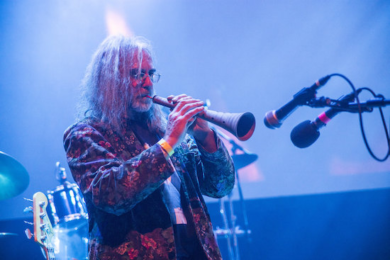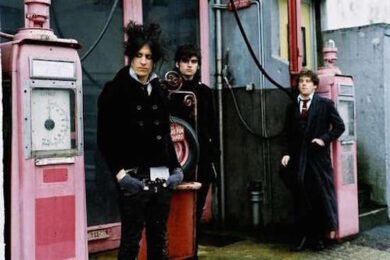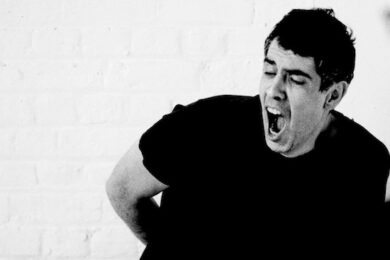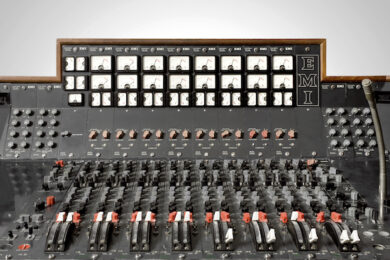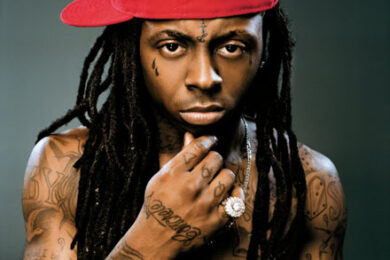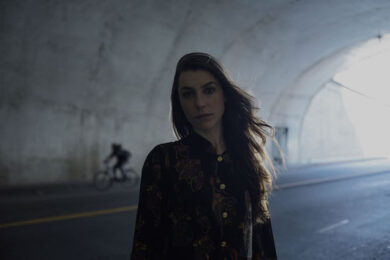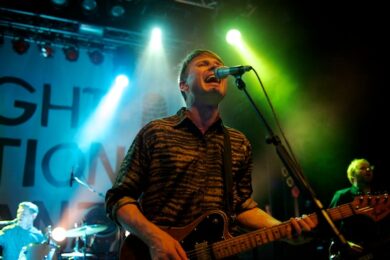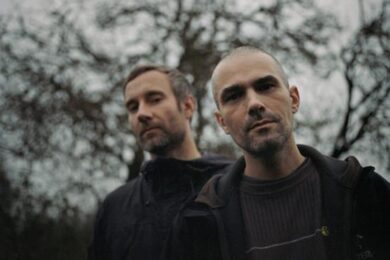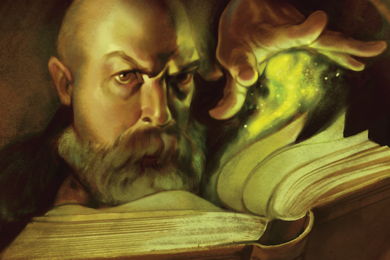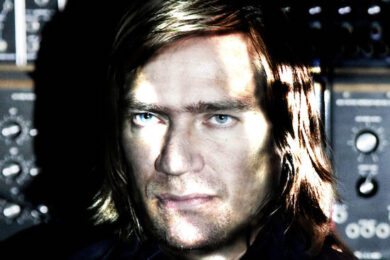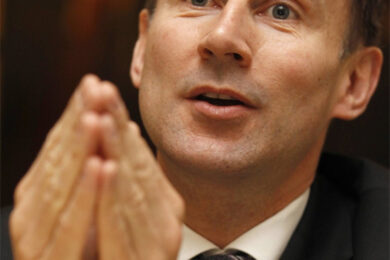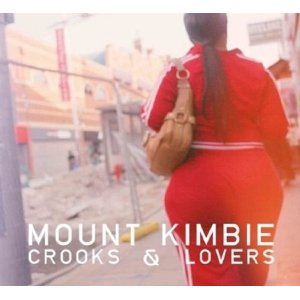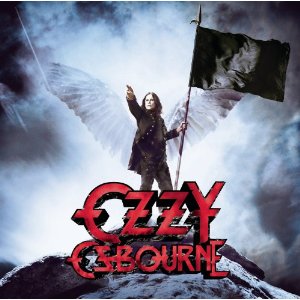"It’s kind of a stuttering tour," says Jim Reid, speaking to tQ from his home in Devon. "We’re off here and there and then we’re back home for a while, and then it’s London at the weekend, then America shortly after that." That summary of the current touring pattern of The Jesus And Mary Chain is, perhaps, typical of their front man’s enduring modesty. Suddenly, three decades after they launched themselves feet-first at an unsuspecting scene, The Mary Chain are still that band you loved as a sullen, self-regarding teen, but now they’re that band you love as a sullen, self-regarding, lawn-mowing, mortgage-toting adult. And that enduring love (bolstered by subsequent work that, to be fair, hasn’t always had its due credit) is built on unshakeable foundations: Psychocandy.
We’re talking because, 30 years after its original release, the band is not only part way through a string of commemorative dates in which it’s playing that fiery debut in full, but is also set to release The Jesus And Mary Chain Live At Barrowlands, a document of the tour’s first leg, recorded in Glasgow last September.
Thirty years, then. Where the hell did that go? On reflection, 1985 seemed woefully under-prepared for that opening battery. The Smiths (Meat Is Murder), The Cure (The Head On The Door) and New Order (Low-Life) continued to agitate while managing to actually sell records, but beyond this limited crossover, the broader music scene was starting to gorge on new and shinier emerging markets. VH1. Rock In Rio. And, of course, Live Aid: Geldof’s charity behemoth that raised millions for famine relief in Ethiopa while conveniently sky-rocketing the careers of its principal performers. The Reid brothers’ debut was eventually certified gold, going on to sell over 100,000 copies in the UK. But Psychocandy vs 1985’s chart-chomping Brothers In Arms (oh, the irony!) was hardly a fair fight, and The Mary Chain, you suspect, weren’t exactly sat by the phone waiting for Sir Bob to call.
An initial run of UK dates last November to mark the album’s anniversary quickly sold out and a fuller UK tour followed earlier this year, along with shows in the US, Canada and Mexico. With fans of all ages – "It’s strange – we get the original fans, sure, but there are young kids out there, too" – keen, it seems, to revisit the band’s best-loved album. Those new US dates – along with a small European tour – will keep Reid and band (alongside brother William on guitar – Phil King, Brian Young and Mark Crozer on guitar, drums and bass respectively) busy through the summer and into September.
Thirty years is test enough of any album and Psychocandy still packs a mighty, and timeless, wallop. It might have emerged at the time as a blank and snarling expectoration, a sour work that had little in common with the over-arching community of the day: imagine U2 or Simple Minds daring to take the band on tour with them, tasking them with warming up their arms-aloft, come-together stadium circuses. But, after all this time, it sounds anything but un-involving, and carries more gravitas than you might have dared imagine. Of course, a lovingly remastered 2011 release gave Psychocandy a deserved second wind, but it’s in its newly invigorated live guise that it swells and blooms. The dissenters, as Reid is keen to point out as we speak on the phone, were wrong then and they’re wrong now.
The live album feels like an affirmation, post-YouTube, of an almost forgotten form. It’s loud and raw and it sounds, well, bloody live.
Jim Reid: Yeah, yeah. It’s kind of got to be, really. I don’t like live records where you can tell that they’ve taken it into the studio and over-dubbed it to hell. I mean, it should be live; it should be what it was. There are no overdubs with this record at all. It’s just a pretty basic mix and an honest record of what we were doing on the night.
It had to be recorded at Barrowlands, right?
JR: Yeah. Absolutely. That was what made most sense. The crowd went mental, so yeah, that was a good one.
You’re playing a ‘hits’ set featuring the likes of ‘April Skies’ and ‘Some Candy Talking’ before you play Psychocandy in its entirety. Have you kept to that same set of opening songs so far?
JR: Yeah. We have. We’ve been doing that opening set for a while now but we’re looking at re-jigging it. We’ve done quite a few shows like that now so we will be doing some different songs for the coming shows, definitely.
Bands revisiting one of their key albums, and playing it in its entirety – that could have been such easy meat for the cynics but it’s starting to play out as a valid route for established bands to re-connect with their audience deep into their career. It’s actually quite celebratory, isn’t it?
JR: It is. It’s also a bit of a challenge, too. Yeah, I mean this record we made thirty years ago, it’s got to be bloody good if we can go out there and tour with it in 2015, you know? And it feels good. It took us a while to come round to the idea; people had been trying to get us to do it for a while and it had just never seemed right. Then people started to mention the thirtieth anniversary and we just thought "Fuck it – it’s now or never." And then, the more we thought about it, we realised that there were a good few songs on that album, for one reason or another, we’d never played live. So we thought, "Let’s do it, let’s give Psychocandy a good tour around the world."
It’s become easy over the years to focus on the madness that surrounded your early career but this is about shining a light on the music, right?
JR: Well, yes. I guess all that hullabaloo that surrounded us when we were playing those songs for the first time, that was partly the reason we were resisting doing a Psychocandy tour. Because I guess we kind of thought that a lot of people think of period as us not being able to stand up on stage, riots, the general chaos and mayhem that followed us around. And here we are in our fifties now and it just doesn’t seem right. But then you start to realise that it’s not about that, you know? It’s about taking the album out and, as you say, shining a light on the album and not the madness that went on around it. As you say, it’s a celebration of songs that we recorded in 1985. So when you look at it from that point of view, it just makes a bit more sense.
Do you think we focussed too much on peripheral factors back then? Coming back to the album after all this time forces you away from the attitude, the scene, even the sound. It sends you back to the song craft.
JR: Well I’m glad you say that. Yeah, that’s true. Also, another reason it makes sense to be doing it now is that at the time, the record got a lot of critical acclaim but it got hardly any radio play and we were barely on TV. It was seriously overlooked in many quarters. I mean, daytime radio! ‘Just Like Honey’ should have been a worldwide smash hit single. The fact of the matter is, it never got any daytime radio play at all in 1985. So, it’s great to go back to it. It’s like a great "Fuck you" to all those people who overlooked it: those people who wouldn’t give it the time of day back then. It’s great to be able to show those people that we’re still here, that there are people who still want to hear this record and that, ultimately, we were right and they were wrong.
You can’t help but think that in our blinkered and homogenised indie pop times, if a band The 1975 came out with a ‘Just Like Honey’, you’d never hear the end of it.
JR: Well, a lot of it has to be due to the time when we made that record. Think about it – I don’t know how old you are but in the mid-80s, can you remember the vice-like grip that Radio 1 had on the music scene?
God, yes.
JR: Well, quite. It was a disgrace, really. We were making these records that were being seriously over-looked by this fucking company that could make or break your career and certainly wasn’t interested in fucking playing interesting records. They were more interested in molesting children, I guess…
Do you think you received enough credit for the lyrics on Psychocandy? There’s a gripping duality at play: on the likes of ‘In A Hole’, there’s a real sense of snarling, self-loathing ("God spits on my soul"); elsewhere, it’s open-hearted and darkly romantic.
JR: Yeah. Maybe. Look, it’s a record we made when we were young and when you’re young, the world seems like an amazing place. Everything is to do with extremes when you’re young. So, I guess that’s where that comes from.
You’ve talked in the past about how, because your parents weren’t music fans, you and William came to develop your tastes and your preferences via, perhaps, untypical means. It’s strange, isn’t it? My parents didn’t even buy a record player until I was in high school.
JR: Yeah, it is odd. It’s very odd. I don’t know where it really came from. Music was not very important to our parents. So it was kinda odd that we were so into it. Mum and dad just didn’t play music, didn’t have any records at all. So, yeah – strange.
Touring was so often a trial for the band. Are you able to enjoy it this time around?
JR: Ooh, enjoy it… Mmm. Yeah. Yeah. It is enjoyable. It’s certainly less stressful now with no record company breathing down our neck. Generally now we do everything at our own pace and for the right reasons. We don’t have to play if we don’t want to. We’re doing it because, well, we enjoy doing it, so…
Does that enjoyment extend to the possibility of recording? You’ve talked on and off about a new album. Is that going to happen?
JR: Yeah. Definitely. There will be a new record. We’ve talked about it for a long time but we’re finally coming around to agreeing as to how and where to record that record. So I would say there will be a new Mary Chain record, and quite soon.
The Jesus And Mary Chain Live At Barrowlands – a 10” + LP + CD deluxe edition package is out on Friday via Demon


